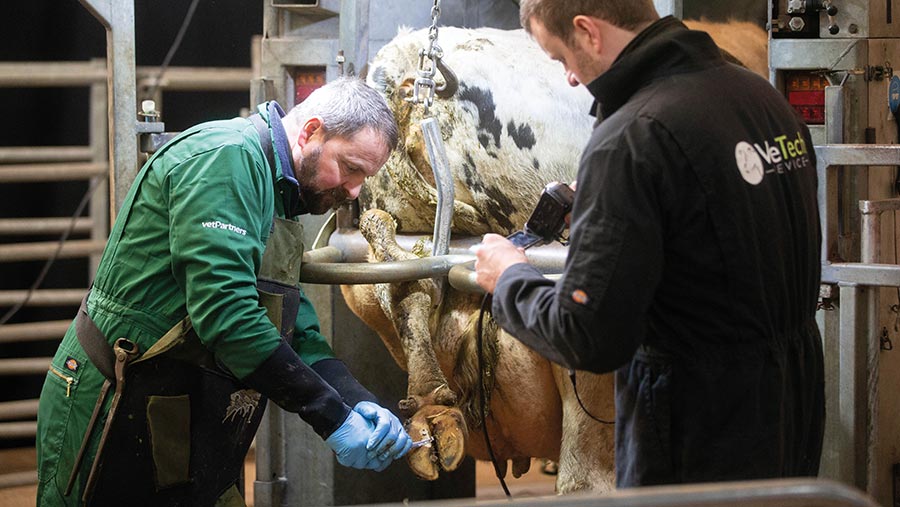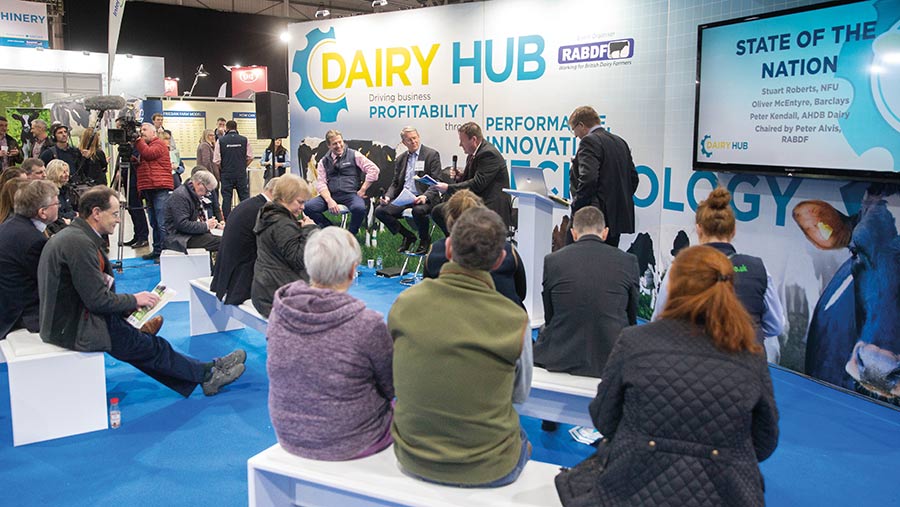What is in store at Dairy-Tech Online 2021?
 © Tim Scrivener
© Tim Scrivener Dairy-Tech Online, running from 3-17 February, is packed with a series of workshops, webinars, conferences, new product briefings and debates.
Replacing Dairy-Tech at Stoneleigh Park, because of the Covid-19 pandemic, Dairy-Tech Online will feature some of the popular attractions of the live event, including the Innovation and Dairy Hub and foot-trimming demonstration.
The fortnight of activity promises to have something for every type of dairy farming system.
International speakers will feature in many of the sessions, due to the increased accessibility that an online event allows.
Together with experts from the UK, they will cover the latest dairy innovations, timely policy updates as well as practical workshops – including sessions on mental health in farming and Brexit.
See also: How to decide if investing in dairy tech is worthwhile
The finale of the fortnight will be the celebration of the 100th Gold Cup, sponsored by the Royal Association of British Dairy Farmers (RABDF) and National Milk Records (NMR), and the announcement of this year’s winner.
There are six finalists vying for the trophy – picked from a record number of entries.
Delegates can tune in from their own homes, with the daily online sessions starting every day after morning milking at 10.30am. Sessions will be recorded and available to view afterwards.
Here is a look at just some of the sessions on offer.
Dairy Hub
The event kicks off with the day-long Dairy Hub on 3 February.
One of the highlights will be a panel debate on “Challenges and opportunities for dairying” with farm minister Victoria Prentis, AHDB chairman and farmer Nicholas Saphir and NFU dairy board chairman Michael Oakes.
There will also be forums focusing on animal welfare, how farmers can achieve net-zero emissions, as well as some overseas learnings from Dan Brown, head of dairy at Australian Fresh Milk Holdings.

© Tim Scrivener
Animal health workshops
The animal health advice workshops on Friday 5 February will offer practical information and updates on some of the prominent health issues affecting the industry.
An increased drive by supermarkets and processors to reduce antibiotics use means good health in all aspects of dairy farming is vital.
During the hour-long session, leading experts and farmers will cover the following topics:
- Identifying and managing TB risks
- Calf health
- Technology to detect mastitis
- Benchmarking for antimicrobial resistance
Hoof-trimming demonstrations
Lameness is one of the most significant welfare and productivity issues dairy farmers face across the UK.
The demonstrations will be virtual and, like the live event, will be led by experienced cattle lameness vets James Dixon and Tom Wright, from Vet Partners.
Through the collaboration of veterinary and animal health forces across the industry, the lameness seminar on Friday 12 February will have some key takeaway points for all dairy farmers. Highlights include:
- Best practice foot trimming and video demonstrations of the correct method
- Lesions to look out for
- How to prevent lameness effectively in the future to improve productivity.
To make the demonstrations as valuable as possible, delegates will be encouraged to ask questions.
Innovation Hub
The Innovation Hub on Wednesday 10 February will be showcasing all things new – products, ideas, technology, concepts and techniques.
The Centre for Innovation and Excellence in Livestock (CIEL), along with other companies and organisations, will be presenting some of the latest research findings in the dairy sector.
Delegates can also find out which company will receive the prestigious Royal Dairy Innovation Award.
This will be awarded to a company exhibiting at Dairy-Tech Online with the most practical, relevant product or service that is, or is likely to be, the most significant innovation for the future of dairying.
Mental health
On Thursday 11 February, New Zealand dairy farmer and mental health advocate Wayne Langford will be discussing his battles with mental health and how he has overcome them.
Organic focus
On Monday 15 February, a seminar focusing on the organic sector will look at post-Brexit opportunities and challenges and how the sector has been affected by the Covid-19 pandemic.
Chaired by journalist Chris Walkland, the session, titled “A brave new world”, will bring organic farmers the latest news and views on what has been happening in the sector in the first six weeks of the year, and what the prospects are for the rest of the year.
Diversification success stories
Warwickshire dairy farmer George Clarke will be among the speakers talking on Monday 8 February about ways they have diversified their businesses.
Mr Clarke recently installed a milk vending machine at Chesterton House Farm to offer fresh milk to the local community.
He is selling lightly pasteurised milk in glass bottles from his herd of just over 100 cows. As well as milk, the farm is selling cheese on a Saturday and fresh bread.
The session will also cover what grants are available to support dairy diversifications.
Market overview
Dairy-Tech Online will feature a milk markets and marketing session on Tuesday 16 February, exactly six weeks after the UK formally left the EU single market.
Led by Kite Consulting’s John Allen, the session will feature the UK’s two biggest dairy companies, with Muller Milk and Ingredients operations director Rob Hutchison, and a representative from Arla Foods.
Also on the panel will be journalist, commentator and market analyst Chris Walkland.
Grazing
Fourth-generation dairy farmer Andrew Hoggard, who milks 560 Holstein Friesian cows at Matai Awa, near Feilding, North Island, New Zealand, will be among a group of farmers from across the globe talking about making the most from grass during a grazing session on Wednesday 9 February.
His cows are outside year-round, made possible by an average winter temperature of 12C and a summer mean temperature of 25C.
How to make automation work for you
On Thursday 4 February, delegates can discover the benefits of milking robots from a panel of farmers, including last year’s Gold Cup winner, Robert Sloan.
They will discuss how investing in automation also allows flexible working hours and a better work-life balance.
During the session, there will be an opportunity to discover how one of the latest data modules from Lely is helping refocus a dairy unit’s objectives from high yield to economical yield, ensuring each individual cow is optimally fed and, in turn, achieves improved efficiency.
Delegates will be able to hear how one farmer is exploiting the data to make 30% concentrate savings alone. This does not include other savings derived from reduced vet and medicine bills.
To register to watch the content online for free, go to the Dairy UK website.
